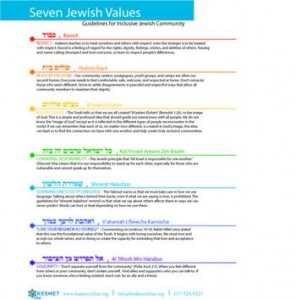
By Idit Klein
Idit Klein is the executive director of Keshet, a national grassroots organization that works for the full inclusion of gay, lesbian, bisexual, and transgender (GLBT) Jews in Jewish life.
“As a shul, we need to do everything we can to be inclusive,” says Rabbi Robyn Fryer Bodzin.
That’s why you’ll soon see a framed copy of Keshet’s “Seven Jewish Values: Guidelines for Inclusive Jewish Community” poster when you walk into the Israel Center of Conservative Judaism in New York, where Bodzin is the rabbi.
“The poster says to everyone who walks into our shul, ‘This is what we stand for’,” Bodzin adds. “I firmly believe that if these values guide our interactions with one other, this will transform a community into a Kehillah Kedoshah, a sacred community.”
Keshet created the “Seven Jewish Values: Guidelines for Inclusive Community” poster as a simple way to connect core Jewish values to our efforts to foster GLBT (gay, lesbian, bisexual, and transgender) inclusion in the Jewish community.
The poster was initially created as a handout for Keshet workshops  on GLBT inclusion in synagogues, Hebrew schools, day schools, camps, and youth groups. In 2008, we published a version of “Seven Jewish Values” in the Hineini Curriculum Resource Guide, a comprehensive companion to the Keshet-produced film, Hineini: Coming Out in a Jewish High School that includes user-friendly activities, lesson plans, and resources on GLBT issues for use with youth in grades 7-12.
on GLBT inclusion in synagogues, Hebrew schools, day schools, camps, and youth groups. In 2008, we published a version of “Seven Jewish Values” in the Hineini Curriculum Resource Guide, a comprehensive companion to the Keshet-produced film, Hineini: Coming Out in a Jewish High School that includes user-friendly activities, lesson plans, and resources on GLBT issues for use with youth in grades 7-12.
Educators immediately encouraged us to create a larger, poster-size version of the handout, and we followed their advice, purposefully crafting the text on the poster to speak about diversity and inclusion in a very broad sense—interfaith families, Jews with disabilities, Jews from diverse ethnic, racial and socio-economic backgrounds are all included in these values.
“Seven Jewish Values” dovetails perfectly with the excellent work that many Jewish educators are already doing. Indeed, since we began distributing the poster this year, we’ve heard of some really creative ways Jewish professionals are using them. For example:
The poster also opens up new ways for Jewish educators to teach fundamental Jewish concepts in a more expansive way. For example, if you are teaching about Genesis and the creation story, why not adapt the lesson plan to include the interpretation of Ha-Adam, the first being G-d created, as transgender (“male and female, [G-d] created them” (Genesis 1:27)? Or, instead of narrowly focusing the second value on the poster, Shalom Bayit – Peace in the Home, as a lesson on respect for parents, why not think about “home” in a community context—such as, a bunk for kids at summer camp or a synagogue for teens in a youth group?
The “Seven Jewish Values Poster” is available online from Keshet. Other resources also available online include the documentary film Hineini: Coming Out in a Jewish High School, the companion Hineini Curriculum Resource Guide, GLBT Jewish Safe Zone stickers and, coming this month, Torah Queeries: Weekly Commentaries on the Hebrew Bible. If you have any questions about these resources or want more information about how to make your community inclusive, contact Keshet at [email protected] or 617.524.9227.
Download: Seven Jewish Values: Guidelines for Inclusive Community handout
Keshet is a national, grassroots organization that works for the full inclusion of gay, lesbian, bisexual, and transgender (GLBT) Jews in Jewish life. Led and supported by GLBT Jews and straight allies, Keshet offers resources, trainings, and technical assistance to create inclusive Jewish communities nationwide. www.keshetonline.org